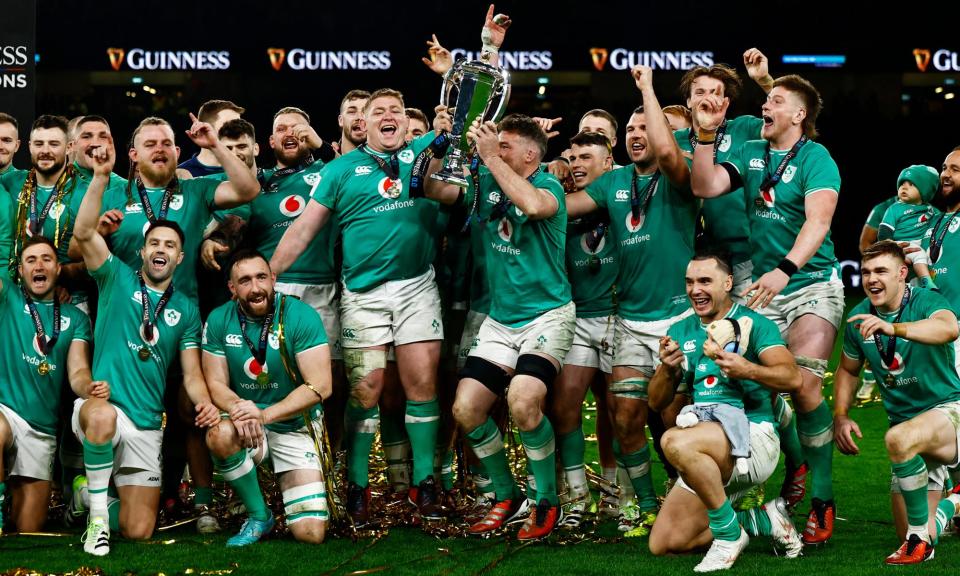Battling Ireland overcome defiant Scotland to retain Six Nations title

In the end a bit of an anticlimax, for the neutral at least. The scenes at the Aviva Stadium come the final whistle were familiar. Another Ireland win, a 19th consecutive such result at home; another Six Nations title. But this was not secured with the imperious air we have come to expect of this team.
After withstanding a fearful battering in the second half for the concession of only 10 points, Scotland struck with two minutes to play with a typically incisive score, Huw Jones slicing through grasping Irish hands to narrow the deficit to four points again. The visitors were after a gong of their own – the triple crown. Ireland were down to 14, after Harry Byrne had been shown the latest yellow for an accidental clash of heads
Irish fans might have been nervous at that point, but Ireland kicked long, and Scotland knocked on as they tried the almost inconceivable. Ireland had the result they needed and with it a second consecutive Six Nations title. They will rue that defeat at Twickenham, because there is plenty of reason to consider this team worthy of something special. The first team to secure back-to-back grand slams would have been such an accolade.
Related: Peter O’Mahony coy on future after Ireland’s ‘special day’
The scenes at the end might have been familiar, but this was at least as unconvincing a performance in its own right than that of last week, particularly in the first half. A 7-6 lead at half-time was more than Ireland were worth. They looked out of joint. Far from motivated to bounce back from that surprise defeat at Twickenham, they seemed disoriented by it.
Scotland are as familiar as anyone at suffering an Irish full-frontal. But they often come here following some euphoric victory over, say, England at Murrayfield and duly implode. This time, they arrived on the back of a sobering defeat of their own, in Rome. They hardly lit up the Aviva Stadium from the word go, but they absolutely looked comfortable handling whatever it was Ireland threw at them.
Two Finn Russell penalties accounted for their tally at half-time, neither exactly the result of intolerable Scottish pressure. Ireland’s tally at the break, though, was gifted to them. They could not even get their reliable lineout-and-drive routine going, sending one penalty to the corner and tamely ending up in touch at the resultant attempt to drive over Scotland’s line.
It was at the subsequent lineout that Ireland scored. George Turner could not find Grant Gilchrist, and Dan Sheehan gathered the ball at the tail of the lineout. Scotland’s defence was in no position to stop a player like that rampaging to the line.
Other than that, Ireland never looked like crossing in the first half. Their kicking game was loose. Andy Christie was the next closest player to scoring in the first half when he charged down James Lowe.
Irish flatness was not confined to the field. The faithful in the stadium were just as subdued in the first half, but crowds have a symbiotic relationship with their team. Ireland duly upped the pace at the start of the second period – and we had our inferno again.
Lowe and Bundee Aki combined down the left; Ireland surged with some of the old gusto; The Fields of Athenry rang out. Something more familiar on the field at least, but the scoreboard retained the general sluggishness. Jack Crowley, having missed a penalty in the first half, found the mark when Zander Fagerson was caught offside from that attack.
Scotland’s tackle count, pretty high already, if comfortable, suddenly ballooned, as did the penalties against them. Still, Ireland could not quite make it tell. They might easily have stretched their lead to seven by kicking any of several penalties, as they set up camp in Scotland’s 22. A draw was more than they needed to secure the title, after all. But they tapped or went to the corner each time.
Scotland have had a terrible time at the hands of the TMO during this championship, but they rode their luck this time. Tadhg Furlong thought he had scored, but Fagerson, his opposite number, managed to dislodge the ball. Whether Furlong managed to touch it down regardless was difficult to determine, but it seemed Fagerson had knocked it forward out of his hand. Scotland were awarded the ball.
Download the Guardian app from the iOS App Store on iPhone or the Google Play store on Android by searching for 'The Guardian'.
If you already have the Guardian app, make sure you’re on the most recent version.
In the Guardian app, tap the Menu button at the bottom right, then go to Settings (the gear icon), then Notifications.
Turn on sport notifications.
Robbie Henshaw was next to claim a try, early in the final quarter. Garry Ringrose, brought on to the wing for his return from injury, intercepted at a rare Scotland attack, and the passage ended with Henshaw going for the line. He was held up, but Scotland had conceded multiple penalty advantages in the buildup. Ewan Ashman conceded the third and saw yellow for his pains.
That was the straw. Ireland tapped again in front of the posts, and Rónan Kelleher’s reverse flick sent Andrew Porter charging to the line, which opened an 11-point lead with 15 minutes remaining.
Ireland would not quite need all of those points, but when the opportunity presented itself to boot the ball into the stand and claim the win they did so gratefully. They had done enough. Champion teams always do.
